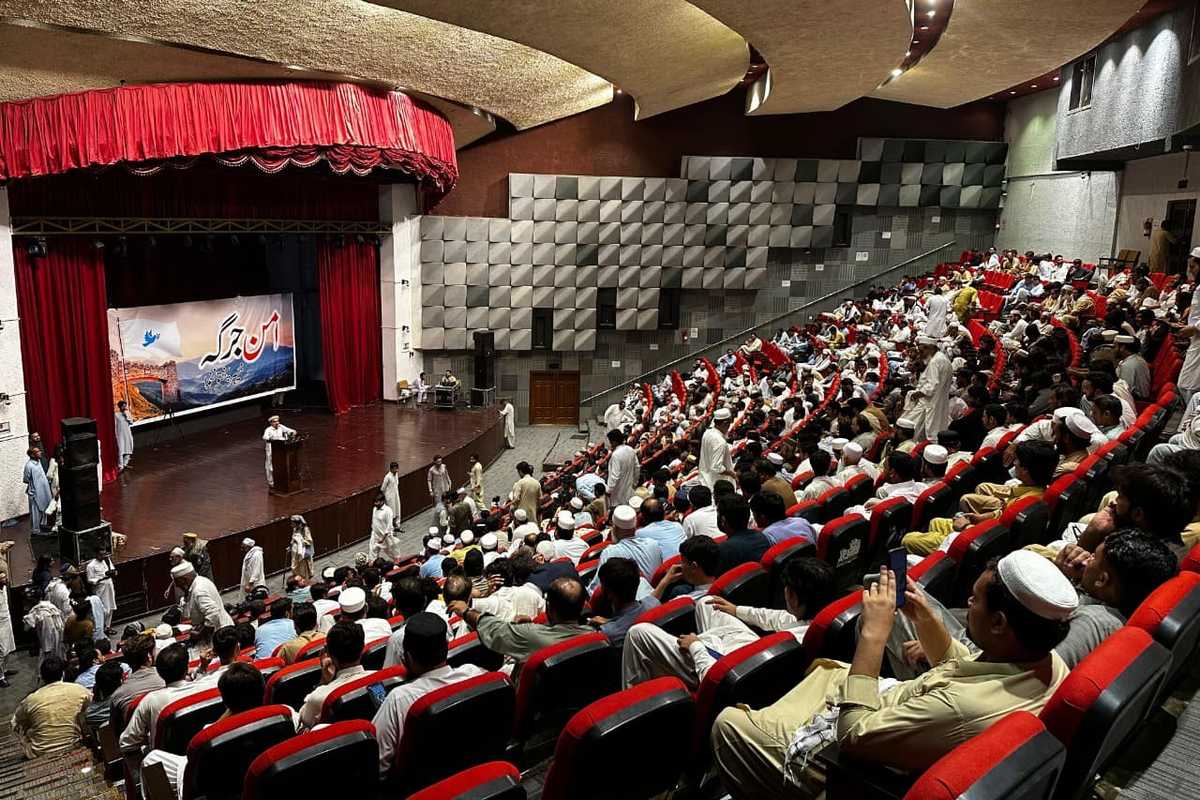Tribal council in northwest Pakistan rejects military operations, calls for peace
Among several demands, the tribal council urged ending military operations and launching peace talks with Afghanistan through jirgas

Kamran Ali
Correspondent Nukta
Kamran Ali, a seasoned journalist from Khyber Pakhtunkhwa, Pakistan, has a decade of experience covering terrorism, human rights, politics, economy, climate change, culture, and sports. With an MS in Media Studies, he has worked across print, radio, TV, and digital media, producing investigative reports and co-hosting shows that highlight critical issues.

Tribal elders meet in a jirga on Friday.
Nukta
A major tribal jirga in northwest Pakistan has opposed plans for a military operation in Khyber Pakhtunkhwa (KP) province, urging authorities to focus instead on longstanding issues of militancy, insecurity and the province’s unmet financial and constitutional rights.
The Aman Jirga KP, held at Peshawar’s Nishtar Hall, brought together tribal elders, politicians, lawmakers, ministers, lawyers, and social activists to address the region’s chronic challenges.
The council unanimously adopted a 10-point resolution calling for:
- An end to all military operations and resolution of disputes through tribal jirgas rather than force.
- Immediate initiation of peace talks with Afghanistan, involving tribal elders.
- Withdrawal of the Supreme Court’s stay order on the annulment of the Action in Aid of Civil Power Act, which grants sweeping powers to security forces over civil administration.
- Transparency in agreements by the federal government with entities such as the Frontier Works Organization (FWO) and foreign companies, while safeguarding provincial rights under the 18th Amendment.
- Reopening all trade routes with Afghanistan, including Gorsal, Ghulam Khan, Nawa Pass, and Kharlachi, and ending the economic blockade.
- Release of the 3% NFC Award share for tribal districts along with annual arrears amounting to PKR 100 billion.
- Registration of FIRs for victims of drone strikes and mortar shelling in tribal areas.
- Swift return and full compensation for Internally Displaced Persons (IDPs).
- Withdrawal of terrorism, sedition, and rebellion cases against peace activists, release of unjustly imprisoned individuals, and removal of names from Schedule IV.
- Complete abolition of both declared and undeclared curfews in the region.

Jirga members lamented that KP has been “left to confront terrorism alone,” despite being the frontline in the fight against militancy - a struggle that has claimed thousands of lives, destroyed infrastructure, and crippled economic activity. They urged the federal government to take immediate steps to restore peace, strengthen institutions, and release long-promised financial entitlements.
Speaking to Nukta, Gul Zafar, a jirga member and former lawmaker, described the gathering as the start of a broader resistance, pledging to convene jirgas in every district and, with local consent, consider “physical resistance.” “We will raise our voice against all those involved in this ‘game’ to destroy the peace of our region; we will not compromise,” he said.
Zafar argued that previous operations had resulted only in financial and human losses, and that negotiation - not force - was the solution. “We can resolve the issue through dialogue,” he added.
Sahibzada Haroon Rashid, another jirga member, stressed that KP, particularly the tribal belt, has borne the brunt of insurgency and terrorism for more than two decades. “We cannot tolerate this so-called ‘dollar war’; we want peace,” he said.
Rashid described the conflict as one fought for foreign interests and warned that tribal communities would no longer accept such operations. “Pakistan, Afghanistan, and other powers should sit down and resolve these issues, otherwise we will resist,” he urged.







Comments
See what people are discussing